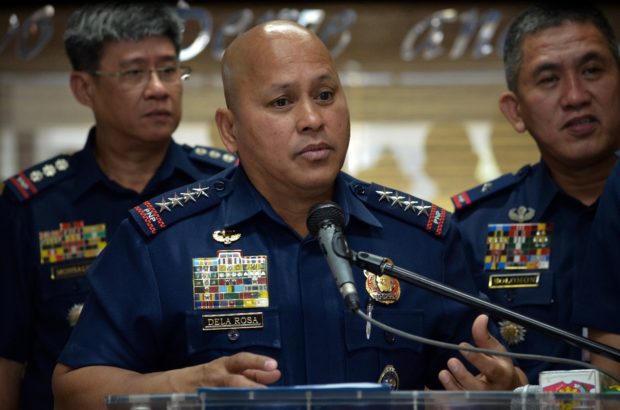
PNP chief Director General Ronald “Bato” dela Rosa. Noy Morcoso / INQUIRER.net FILE PHOTO
“Oplan Tokhang” is back. But this time, it seems different.
Under new guidelines, officers from the Philippine National Police will drop in on drug users and suspected dealers in broad daylight — anytime between 8 a.m. and 5 p.m. — and only on weekdays.
And the visits can be watched live online — if things go as planned.
What’s the catch?
Drug raids can still be carried out at night.
PNP Director General Ronald “Bato” dela Rosa, on Wednesday spoke to reporters about changes in President Rodrigo Duterte’s war on drugs, including use of body cameras by officers conducting antinarcotics operations when these become available.
The police are making a comeback in Mr. Duterte’s ferocious crackdown on the narcotics trade, a few months after he suspended them amid unprecedented scrutiny of their conduct.
New York-based Human Rights Watch (HRW) has counted more than 12,000 deaths since the launch of the drug war after Mr. Duterte came to power in June 2016.
The PNP, however, has challenged the HRW figure.
The PNP spokesperson, Chief Supt. Dionardo Carlos, last week claimed that only 3,987 people had been killed in narcotics operations from July 1, 2016 to Jan. 17, 2018, while 11 percent, or 2,235, of the total 19,560 murders under police investigation were drug-related.
Eighty-five officers had been killed during the 18-month crackdown, according to Carlos.
Body cameras
The entire police force of Caloocan City was sacked after the killings of three minors, which eventually led to the PNP’s demotion from the lead role in the campaign.
The killings stopped when the Philippine Drug Enforcement Agency took over the campaign.
The new guidelines are intended to bring transparency to narcotics operations, with Dela Rosa hoping to erase doubts about the conduct of those in the front lines of the campaign through the use of body cameras.
“Once they are available, we will require them to wear that,” he told reporters at Solaire Resort and Casino, referring to the body cameras.
The PNP chief did not specify when the cameras were expected to be available to the police.
Priority areas
Director Camilo Pancratius Cascolan, the PNP head for operations, said the force had only 100 body cameras so far but these would be given to “priority areas” — places with rampant drug trade and “high-value targets” like illegal drug distributors.
“We want these body cameras connected immediately to the internet so we would be able to see [the conduct of operation] in real time,” Cascolan told reporters in Davao City.
Police reject human rights activists’ allegations that they are executing suspected drug users and dealers in a systematic campaign of abuses and cover-ups.
In a memorandum through which he laid down the guidelines, Dela Rosa ordered police officers to immediately take injured suspects to hospital, and establish a database of those who died in police operations.
Weekday raids only
He also ordered Oplan Tokhang operations — when police visit homes of users and dealers and seek their surrender — to be limited to between 8 a.m. and 5 p.m. on weekdays.
“It has to be daytime, so as to erase the impression that if you have been the subject of Tokhang, you would be killed,” Carlos explained in a press briefing at PNP headquarters in Quezon City on Wednesday.
He said officers would be required to wear their uniforms during narcotics operations.
Under the new guidelines, Tokhang teams will be limited to four policemen, led by a commissioned officer, and include members of the barangay antidrug abuse council.
Carlos said representatives of religious, civil society groups and journalists may be invited to join the operations.
In Davao City, Cascolan said the new guidelines required the presence of a government prosecutor after an operation, especially if there had been a shooting, so that the conduct of the operation could be immediately evaluated.
Barangay lists
In the new Tokhang, Cascolan said names disclosed by drug suspects would be checked against barangay lists before being brought up to the municipal, provincial, regional and national levels.
Only after thorough evaluation would the names be returned to the regional police and then to the local police, Cascolan said.
The new guidelines are expected to be implemented starting next Monday. —Reports from Jaymee T. Gamil, Frinston Lim and the wires